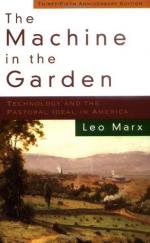
|
| Name: _________________________ | Period: ___________________ |
This test consists of 15 multiple choice questions and 5 short answer questions.
Multiple Choice Questions
1. What percentage of Americans lived on farms (in the time of Marx's writing)?
(a) 60%.
(b) 40%.
(c) 10%.
(d) 25%.
2. What 'sealed the fate' of American industrialism, according to Marx?
(a) Standardized parts.
(b) Machine tools.
(c) The railroad.
(d) The cotton gin.
3. How do modern authors, Marx included, tend to feel about preserving nature in an industrial world?
(a) Cautiously optimistic.
(b) Pessimistic.
(c) Zealous.
(d) Exuberant.
4. What does fire symbolize in Hawthorne's The Unpardonable Sin?
(a) Chaotic forces of nature.
(b) Intellect.
(c) Man's desire for progress.
(d) The demonic element in factories.
5. How did Coxe's vision for industrialism intersect with pastoralism?
(a) Coxe predicted that industries would leave dead places in the environment when they collapsed.
(b) Coxe prophesied that extractive industries would ruin the landscape.
(c) Coxe thought that factories would blight the landscape.
(d) Coxe thought that America's environment would make the factory a pastoral place.
6. What was the general feeling about industrialism in America, as it expanded?
(a) Optimism.
(b) Caution.
(c) Positivism.
(d) Doubt.
7. What did Emerson's philosophy ultimately propose?
(a) Rejection of industry.
(b) Domestication of nature.
(c) Reconciliation of industry and nature.
(d) Urbanization of nature.
8. What does Marx say about modern farming (in the time of his writing this book)?
(a) Modern farming has freed Americans from industry.
(b) Modern farming has become an industry.
(c) Modern farming has preserved nature while offering productive land.
(d) Modern farming has returned Americans to their agrarian roots.
9. What effect does Marx say Emerson foresaw for industrialism?
(a) Control of the worker in his working environment.
(b) Detachment of the worker from his work.
(c) Fulfillment of the worker in his work.
(d) Devaluation of the worker in the market.
10. What was Daniel Webster's feeling about pastoralism?
(a) He thought it would corrupt America's soul.
(b) He set out national parks to preserve pastoral spaces.
(c) He thought it could co-exist with technology.
(d) He thought it would heal industrialism.
11. When was man supposed to return to nature, in Thoreau's vision?
(a) For permanent residence.
(b) He should keep nature alive in his cities.
(c) On weekends.
(d) For temporary respites.
12. What would manufacturing do for America, in Coxe's estimation?
(a) Generate wealth.
(b) Drive western expansion.
(c) Ensure independence.
(d) Unify the electorate.
13. What does Marx say about people who live pastoral lives?
(a) They are fulfilled.
(b) They are isolated.
(c) They are conservationists.
(d) They are leaders.
14. What structures does Marx use as examples of how modern man mistreats nature?
(a) Bridges and tunnels.
(b) Golf courses and cemeteries.
(c) Roads and parking lots.
(d) Hospitals and nursing homes.
15. What is Marx's tone throughout 'The Machine in the Garden'?
(a) Reverential and despairing by turns.
(b) Scientific and analytical.
(c) Analytical and pessimistic.
(d) Optimistic and casual.
Short Answer Questions
1. Which industry has Marx talked most about, in 'The Machine in the Garden'?
2. What feature of modern society came into existence with American industrialism?
3. How would you describe Marx's book 'The Machine in the Garden'?
4. What did Emerson originally propose in his philosophy?
5. What was the American response to steam power in Britain?
|
This section contains 518 words (approx. 2 pages at 300 words per page) |

|




